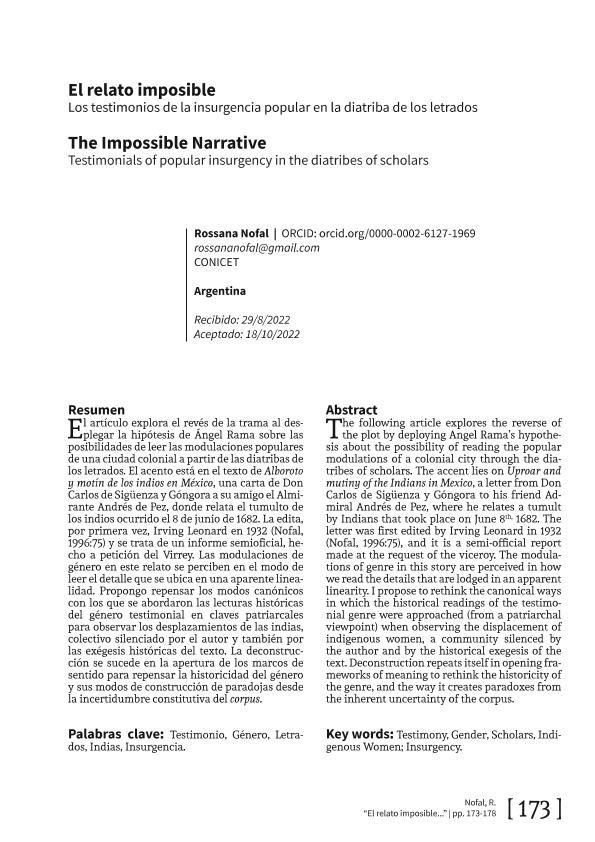Artículo
El ensayo explora el revés de la trama al desplegar la hipótesis de Ángel Rama sobre las posibilidades de leer las modulaciones populares de una ciudad colonial a partir de las diatribas de los letrados. El acento está en el texto de Albotoro y motín de los indios en México, una carta de Don Carlos de Sigüenza y Góngora a su amigo el Almirante Andrés de Pez, donde relata el tumulto de los indios ocurrido el 8 de junio de 1682. La edita, por primera vez, Irving Leonard en el año 1932 (Nofal, 1996: 75) y se trata de un informe semioficial, hecho a petición del Virrey. Las modulaciones de género en este relato se perciben en el modo de leer el detalle que se ubica en una aparente linealidad. Propongo repensar los modos canónicos con los que se abordaron las lecturas históricas del género testimonial en claves patriarcales para observar los desplazamientos de las indias, colectivo silenciado por el autor y también por las exégesis históricas del texto. La deconstrucción se sucede en la apertura de los marcos de sentido para repensar la historicidad del género y sus modos de construcción de paradojas desde la incertidumbre constitutiva del corpus. The following article explores the reverse of the plot by deploying Angel Rama’s hypothesis about the possibility of reading the popular modulations of a colonial city through the diatribes of scholars. The accent lies on Uproar and mutiny of the Indians in Mexico, a letter from Don Carlos de Sigüenza y Góngora to his friend Admiral Andrés de Pez, where he relates a tumult by Indians that took place on June 8th, 1682. The letter was first edited by Irving Leonard in 1932 (Nofal, 1996:75), and it is a semi-official report made at the request of the viceroy. The modula- tions of genre in this story are perceived in how we read the details that are lodged in an apparent linearity. I propose to rethink the canonical ways in which the historical readings of the testimonial genre were approached (from a patriarchal viewpoint) when observing the displacement of indigenous women, a community silenced by the author and by the historical exegesis of the text. Deconstruction repeats itself in opening frameworks of meaning to rethink the historicity of the genre, and the way it creates paradoxes from the inherent uncertainty of the corpus.
El relato imposible: Los testimonios de la insurgencia popular en la diatriba de los letrados
Título:
The impossible narrative: Testimonials of popular insurgency in the diatribes of scholars
Fecha de publicación:
10/2022
Editorial:
Universidad Nacional de San Juan. Facultad de Ciencias Sociales. Instituto de Investigaciones Socio-Económicas
Revista:
RevIISE
ISSN:
2250-5555
Idioma:
Español
Tipo de recurso:
Artículo publicado
Clasificación temática:
Resumen
Palabras clave:
TESTIMONIO
,
LETRADOS
,
DIVERGENCIA
,
CUENTOS
Archivos asociados
Licencia
Identificadores
Colecciones
Articulos(INVELEC)
Articulos de INSTITUTO DE INVESTIGACIONES SOBRE EL LENGUAJE Y LA CULTURA
Articulos de INSTITUTO DE INVESTIGACIONES SOBRE EL LENGUAJE Y LA CULTURA
Citación
Nofal, Silvia Rossana; El relato imposible: Los testimonios de la insurgencia popular en la diatriba de los letrados; Universidad Nacional de San Juan. Facultad de Ciencias Sociales. Instituto de Investigaciones Socio-Económicas; RevIISE; 20; 20; 10-2022; 173-178
Compartir




